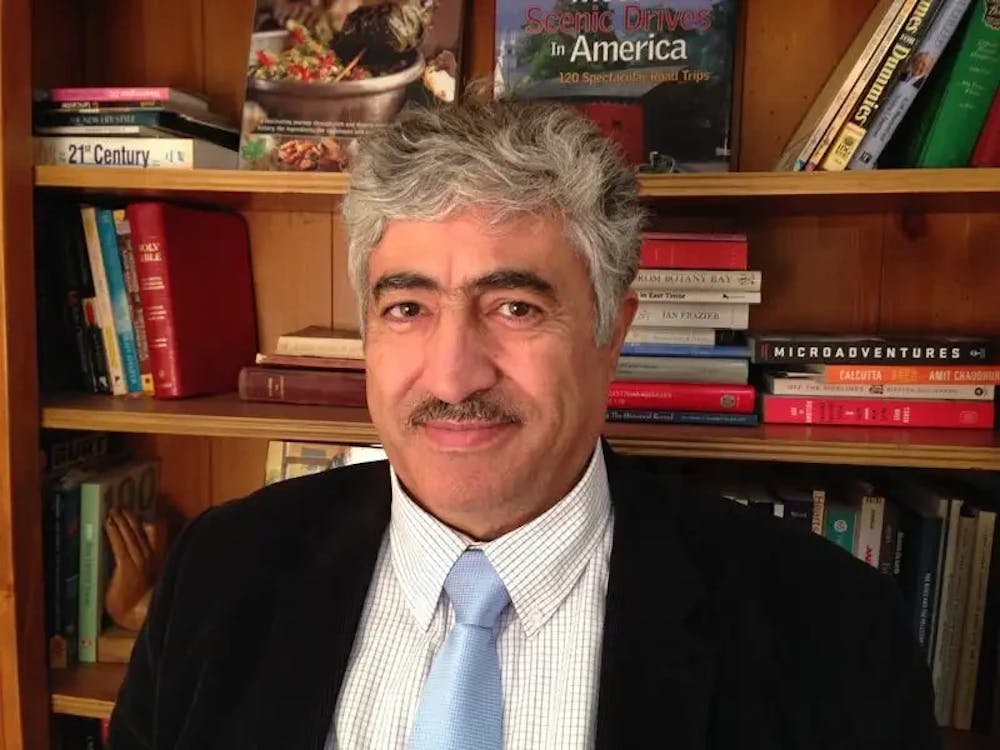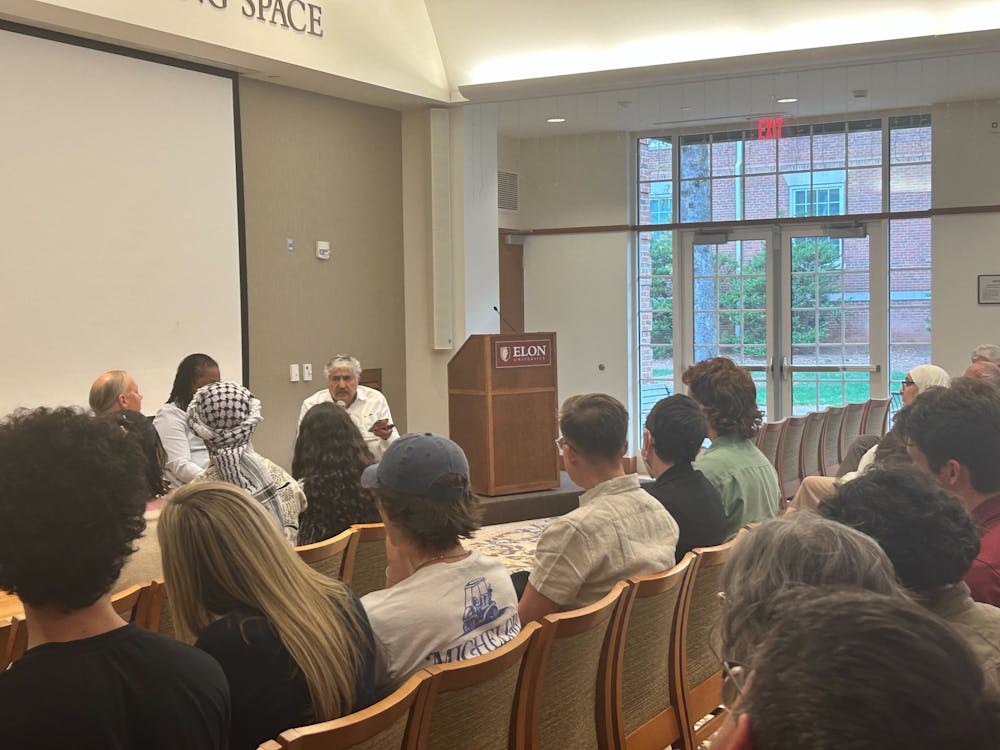Elon University President Connie Book today acknowledged the controversy surrounding a speaker whose talk "Is Peace Possible in the Middle East?" earlier in the week left some audience members rattled.
In an email to the university on April 12, Book said that Jonathan Kuttab's remarks "left the agreed-upon format on the anticipated topic of peace building, and he provided additional views and opinions on the conflict."
"Several members of the community in attendance deeply disagreed with his divergent comments," Book wrote. "Not anticipating the changes to the speaker’s planned remarks, the event’s design did not include plans for opposing views to be offered at that moment, and limited time did not allow for all submitted questions to be heard.”

Kuttab, an international human rights lawyer and co-founder of the Palestinian human rights group Al-Haq and Nonviolence International, spoke to the Elon community on Monday, April 8, on possible solutions to the Israel-Hamas War.
During the event, Kuttab discussed his perspective on the Israel-Hamas War and said that he would challenge the narrative in ways not everyone would agree with.
“My very presence here, despite my professions of peace and what you have seen, reconciliation, of wanting resolution is because I challenge an ongoing narrative, which people want to maintain at all costs,” Kuttab said.
The speech was part of a series of events organized by the Ad Hoc Conflict in the Middle East Programming Committee. In her email, Book said she has directed the committee to “continue its important work of bringing forward multiple perspectives and to consider how Elon can further foster meaningful dialogue on the Middle East conflict.”
Throughout his talk, Kuttab repeatedly referred to the Israel-Hamas War as a genocide.
In January, the United Nations’ court did not rule on whether Israel was committing genocide, although it did direct Israel to take action to prevent acts of genocide in the Gaza Strip. In his speech, Kuttab blamed the Israeli government for inflammatory comments.
“Never before in history has there been a clear, ongoing genocide taking place in real time that people can see every day,” Kuttab said. “With clearly genocidal statements being made, not by fringe groups, but by everybody from the prime minister, to the defense minister, to the head of the army … openly says, ‘We want to kill, we want to destroy, we want to eliminate, we want to cut off food, water and medicine. We want to flatten Gaza.’”
Audience reaction during the speech was visibly uneasy. At several points during his talk, students would murmur to one another about his comments. At least one audience member walked out in the middle of the speech.
Kuttab is a Palestinian attorney who grew up in Jerusalem and studied law in the United States, graduating from the University of Virginia Law School. He was the head of the legal committee of the Palestinian delegation that negotiated the Cairo Interim Agreement of 1994. He recently wrote “Beyond the Two-State Solution” and “The Truth Shall Set You Free,” which were books about a solution that didn’t assign two separate states but a peaceful and united one as well as his own life story growing up within the Palestinian-Israeli conflict.
Since the Oct. 7 attacks by Hamas and Israel’s subsequent declaration of war, Kuttab has been active on social media, often reposting tweets condemning Zionism and referring to Israel’s actions as genocide. On April 9, he tweeted a link to a Change.org petition saying, “Promote the Peace of Jerusalem: Stand Against Christian Zionist Extremism.”
There have been several other events that Elon has held since the Oct. 7, 2023 attack including support groups, Jewish solidarity walks, protests and multifaith panels. The most recent event held on March 14 invited scholar Mira Sucharov to discuss conflict solutions.
When asked about peace between the two states, Kuttab stated his belief that it was achievable, though the two-state solution was no longer plausible. The two-state solution is an idea in which there are separate Israeli and Palestinian states that live peacefully with security for each. This is a solution that Sucharov proposed during her event at Elon.
Though once a supporter of this idea, Kuttab said he now hopes for a state in which the two can coexist fairly and peacefully — and that a peaceful solution will only happen when both groups are able to empathize with each other.
“Ultimately, peaceful solutions will only come when both these groups, Palestinians and Israeli Jews, learn to understand, empathize with and accept the other,” Kuttab said.
He pointed out the obstacles for this.
“So far, that's been difficult for two reasons,” Kuttab said. “No. 1 is the disparity of power. One group has all the power and the other group is being controlled, and ruled, and oppressed and has little or no power. So this becomes difficult. The other reason is that Israel is — for all their military power and superiority, traumatized and frayed. And we think that the solution is more and more military power, rather than to make peace with the Palestinians.”
Alex Saffelle, a junior who attended the speech for his peace and conflict studies class, appreciated the different perspective but said he thought Kuttab left out important context about the conflict.
“I thought it was interesting to get another perspective, especially from a Palestinian, I thought that was good, especially because Elon has such a big Jewish population so I get that side of the story and I don’t talk to people from Palestine on a regular basis,” Saffelle said. “I think I was a little disappointed that he didn't focus on the international law aspect, which is kind of why I was going.”
Saffelle also said he did not agree with all of Kuttab’s claims and wished his focus was more on whether peace was possible in the Middle East.
“I think a couple of things he said were inaccurate. I definitely didn't agree with antisemitism being a European Christian concept,” Saffelle said. “I thought his base argument was good, I mean I liked his idea but I feel like he didn't even address how he would achieve peace.”
In her email to campus, Book reiterated Elon’s commitment to academic freedom and “maintaining a campus free from all forms of hate and prejudice, including antisemitism and Islamophobia,” but she also acknowledged that discussion on campus about the war has been difficult.
“The war between Israel and Hamas directly affects many of our Jewish and Muslim community members and often challenges the most important and intimate spaces of who we are — our spiritual beliefs,” she wrote. “I have found that dialogue and engagement in this type of space is without question some of the most difficult, not only on college campuses but in life.”


